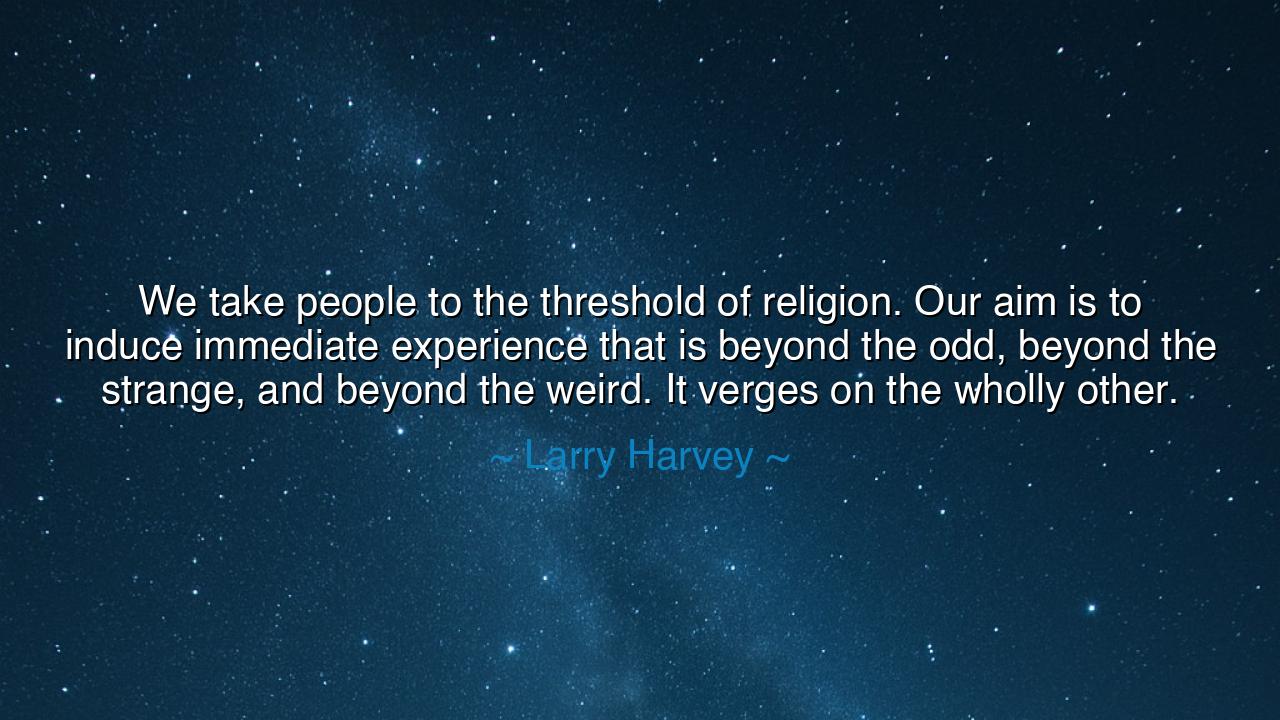
We take people to the threshold of religion. Our aim is to induce
We take people to the threshold of religion. Our aim is to induce immediate experience that is beyond the odd, beyond the strange, and beyond the weird. It verges on the wholly other.






In the vast journey of human experience, there are moments when we stand at the threshold of the unknown, looking into realms beyond the ordinary, where the boundaries of the everyday fade and the extraordinary beckons. Larry Harvey, the visionary behind the Burning Man festival, speaks of this moment in his powerful words: "We take people to the threshold of religion. Our aim is to induce immediate experience that is beyond the odd, beyond the strange, and beyond the weird. It verges on the wholly other." Here, Harvey points us toward a deeper experience—one that transcends the conventional and invites us to embrace a realm of profound mystery, where the soul is called to encounter the divine and the unknown.
Throughout the annals of history, there have been countless instances where the boundaries between the human and the divine have been blurred—moments when the sacred manifested in the ordinary, when the veil between the material world and the spiritual world was lifted. The ancient Greek Mysteries, especially those held in the sacred groves of Eleusis, were designed to take initiates beyond the known, into a space where they could experience the divine presence in a tangible and transformative way. These rites were not simply intellectual exercises; they were immersive experiences that, according to tradition, allowed participants to glimpse the wholly other, the very mysteries of life, death, and rebirth. Much like the vision of Harvey, they sought to lead people to the threshold of something greater, an experience that could not be explained by the rules of everyday life.
Consider the story of Socrates, whose teachings were not confined to the written word or logical argument but were lived in the realm of experience. He guided his followers not just through intellect, but through lived moments of transformation, leading them to question the nature of virtue, truth, and existence. Socrates did not merely tell his students about the divine; he led them to the very edges of spiritual and philosophical mystery. He believed that true wisdom came not from theoretical knowledge, but from experiencing the truth in its raw, unfiltered form. In this way, Socrates took his followers to the threshold of deeper understanding, just as Harvey seeks to do through art, performance, and shared experience.
The power of experience over mere belief is also seen in the shamans of indigenous cultures, who guide their people through rites of passage and visionary journeys. These rituals often involve the use of sacred substances, dance, and music to bring participants to an altered state of consciousness—where they encounter forces beyond the physical world. For these cultures, the spiritual was not something abstract or distant; it was immediate, visceral, and deeply connected to the rhythms of nature and the cosmos. The experiences induced through these rituals were designed to take individuals to the edge of the known world, to allow them to glimpse the otherworldly forces that govern life. Harvey’s words echo this ancient wisdom: that the most profound religious and spiritual experiences come not from the intellect alone, but from direct immersion in the unknown, the mysterious, and the divine.
In the modern world, however, many of us live disconnected from the sacred. We have grown accustomed to the rational and the predictable, and the mysterious has been relegated to the fringes of our consciousness. Yet, as Harvey suggests, we are always on the brink of something greater, something beyond the ordinary that calls us to open our hearts and minds to experiences that are both strange and sacred. These experiences can be found not just in formal religion, but in art, music, and communal activities that push us to step beyond our everyday selves. For example, the Burning Man festival itself is an attempt to create a space where individuals can temporarily leave behind the conventions of daily life and experience a different reality—one where the boundary between the individual and the universal is momentarily dissolved.
What Harvey offers us is a vision of life as a living ritual, where each experience can lead us to the threshold of the divine, where the odd and strange are not to be feared but embraced as part of the sacred mystery of existence. To live in such a way is to open oneself to the possibility of encountering the wholly other, the force or experience that lies beyond human understanding, yet deeply shapes the human condition. Whether through art, community, or personal journey, we are invited to step beyond the veil and experience the deeper truths of our being, to understand that life itself is a sacred journey.
The lesson here is that we must not shy away from the mysterious or the unknown. To live fully is to embrace the strangeness and oddness of existence, to recognize that the most profound truths often lie just beyond the familiar. Like the ancient initiates or the great philosophers, we too must be willing to step into the unknown and allow ourselves to be transformed by experiences that challenge our current understanding. Harvey’s words remind us that the threshold of the divine is always before us, and it is up to us to decide whether we will step forward and embrace the sacred mystery that awaits. To live with open eyes, to dream beyond the boundaries of the everyday, is to touch the divine and experience the fullness of what it means to be alive.






AAdministratorAdministrator
Welcome, honored guests. Please leave a comment, we will respond soon